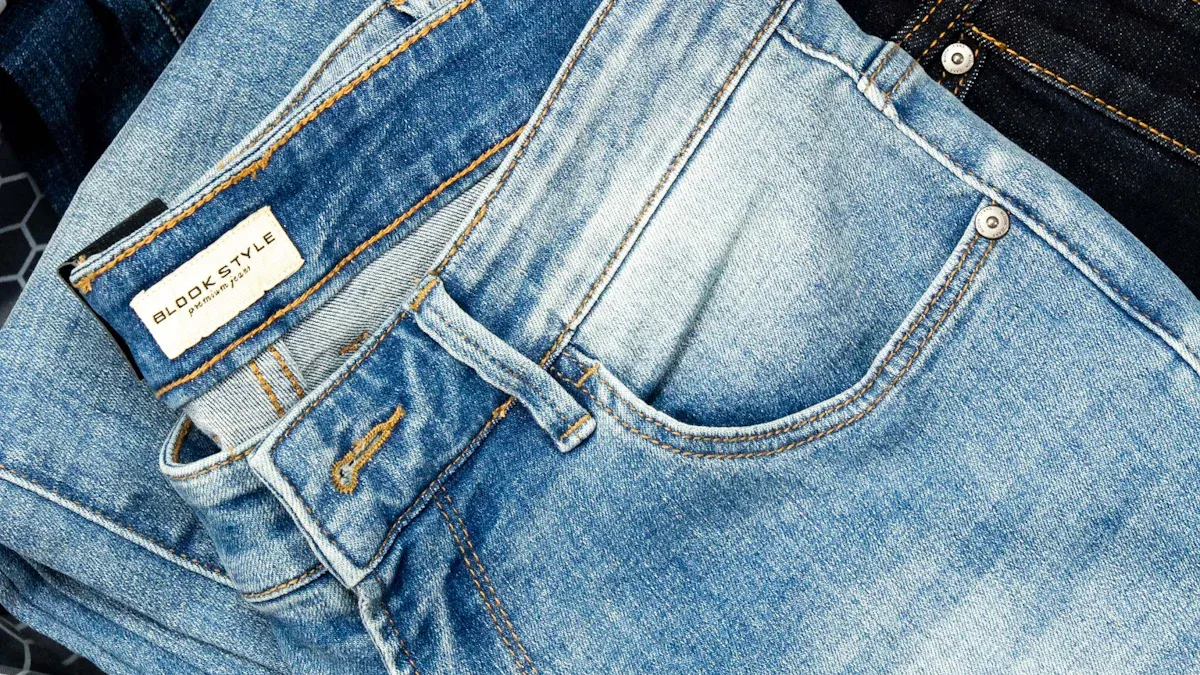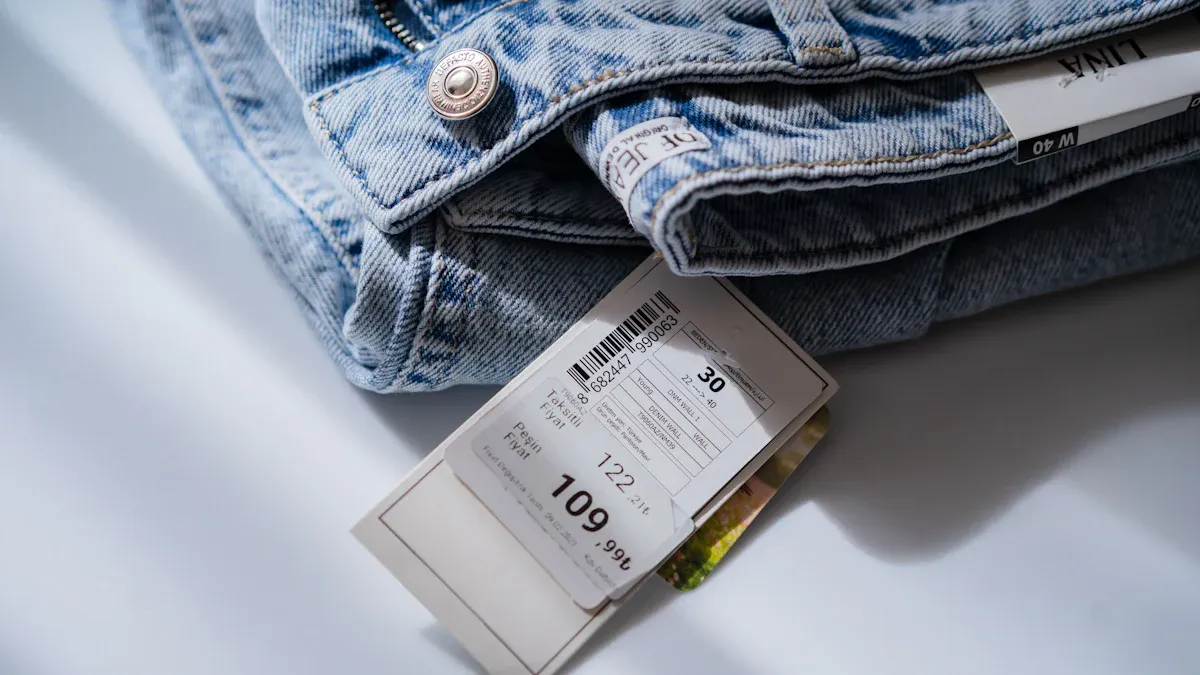
When you start choosing a private label jeans manufacturer, you want to focus on what matters most: quality, customization, minimum order quantities, sustainability, and location. Your choice directly affects how customers see your brand and how satisfied they feel with your products. You should look for private label jeans manufacturers near your market to make shipping easier and build strong relationships. Take a look at this table to see how these factors impact your brand:
Factor | Impact on Brand Reputation and Customer Satisfaction |
|---|---|
Quality Control | Builds trust with consistent, reliable jeans. |
Customization Options | Lets you create styles your customers love. |
Sustainability Practices | Shows you care, boosting loyalty and image. |
Production Speed | Helps you keep up with trends and meet demand. |
Key Takeaways
Focus on quality control to build trust with your customers. Use the American four-point grading system to evaluate denim quality.
Understand minimum order quantities (MOQs) to manage costs effectively. Negotiate with suppliers for flexibility, especially when starting out.
Customization is key to standing out. Choose manufacturers that offer a variety of options for fabrics, styles, and branding.
Prioritize sustainability by selecting manufacturers with eco-friendly practices and certifications. This can enhance your brand’s reputation.
Build strong relationships with your manufacturers through clear communication and regular feedback. This fosters trust and improves collaboration.
Choosing a Private Label Jeans Manufacturer: Key Factors

When you start searching for private label jeans manufacturers, you need to look at several important factors. Each one can shape your brand’s reputation and help you stand out in the denim market. Let’s break down what you should focus on and how you can evaluate each area.
Quality Standards and Consistency
Quality matters most when you want your customers to trust your brand. You should ask denim manufacturers about their quality control systems. Many top producers use the American four-point grading system. This method assigns points for defects based on their length. If a fabric scores under 50 points, it’s considered first quality. Anything above that falls into second quality. You can use this system to compare suppliers and make sure you get quality denim products every time.
Tip: Ask for details about fabric evaluation, shrinkage management, and wash control. These steps help keep your jeans consistent across every production run.
Leading private label jeans manufacturers also store your custom specifications for future orders. This means you get the same fit and finish with every batch. You should request information about their inspection process and how they manage wash recipes. Consistency builds customer loyalty and keeps your brand strong.
U.S. Four-Point Grading System
Defect length less than 3 inches: 1 point
Defect length 3-6 inches: 2 points
Defect length 6-9 inches: 3 points
Defect length over 9 inches: 4 points
Minimum Order Quantities (MOQs)
MOQs can make or break your ability to launch new styles or test the market. You need to know what each private label manufacturer expects before you commit. Some private label jeans manufacturers in the USA ask for 100 to 200 pieces per style. Asian suppliers may offer lower MOQs, sometimes as low as 100 pieces, and allow you to mix styles in one order. If you run a small brand, you can find denim manufacturers who accept orders as low as 20 sets per design.
Region | Minimum Order Quantity |
|---|---|
USA | 100 pieces per style |
Asia | 100 pieces (CreativeTex) per design |
Baagh Enterprises | 20 sets per design |
Note: Building a good relationship with your supplier can help you negotiate lower MOQs. This flexibility lets you test new ideas without a huge upfront investment.
Customization Options and Control
Customization sets your private label jeans apart from the competition. You want to offer styles, washes, and details that reflect your brand’s personality. Most private label clothing manufacturers provide a wide range of options. You can choose fabrics, design elements, washes, distressing, embroidery, and printing. Some even let you add custom labels, branded hardware, and unique packaging.
Customization Option | Description |
|---|---|
Fabric Selection | Choose from various fabric types for jeans. |
Design Elements | Options for different styles and cuts. |
Washes | Variety of wash treatments available. |
Distressing | Custom levels of distressing can be applied. |
Embroidery | Personalized embroidery options. |
Printing Options | Custom printing designs available. |
Custom Labels | Placement of unique labels for branding. |
Branded Hardware | Custom buttons, rivets, and tags. |
Specialized Packaging | Options for unique packaging designs. |
Brands like Bless Denim offer extensive customization, including embroidery, labels, and special fittings. Fast fashion brands may only let you pick basic colors or fits. If you want to build a unique brand, you should look for private label jeans manufacturers who support detailed personalization.
Sustainability Practices
Sustainability is more than a trend. Customers expect brands to care about the environment. You should ask private label jeans manufacturers about their certifications and eco-friendly practices. Look for suppliers with Bluesign, OEKO-TEX, or EU Ecolabel certifications. These labels show that the manufacturer uses safe materials and reduces environmental impact.
Certification | Accredited by | Used for | Examples of Brands | Why it matters |
|---|---|---|---|---|
Bluesign | Bluesign Technologies AG | Sustainable textile production | prAna, Vaude, Helly Hansen | Ensures textiles are produced with minimal environmental impact by evaluating the entire production chain. |
OEKO-TEX | International OEKO-TEX® Association | Textiles, fabrics, and clothing | Pomp, Patagonia, Tentree | Guarantees that an end product is free from harmful substances, with standards updated annually. |
EU Ecolabel | European Union | A wide range of goods and services | Lenzing | Evaluates a product’s lifecycle and certifies those with a reduced environmental impact and high standards. |
Tip: Ask your supplier about their water usage, chemical management, and recycling programs. These steps help you build a responsible brand that attracts loyal customers.
Manufacturer Location and Proximity
Location affects your costs, lead times, and ability to respond to trends. If you source private label jeans from nearby denim manufacturing hubs, you can save on shipping and get products faster. For example, producing jeans in Turkey costs more per unit than in Pakistan, but the lead time is half as long. Mexico offers higher labor costs than Bangladesh, but you benefit from lower shipping costs and faster delivery.
Los Angeles stands out as a denim hotspot. You get access to a creative textile ecosystem, shorter lead times, ethical labor practices, and local expertise. Brands that work with Los Angeles denim manufacturers can adapt quickly to market changes and manage costs more efficiently.
Advantage | Description |
|---|---|
Creative Textile Ecosystem | Access to a vibrant community of designers and manufacturers that fosters innovation. |
Shorter Lead Times | Proximity to production facilities reduces time from design to market. |
Ethical Labor Practices | Commitment to fair wages and working conditions, enhancing brand reputation. |
Local Expertise | Ability to leverage skilled labor and knowledge in denim production and design. |
Cost Efficiency | Dual-tier sourcing model allows for better cost management and flexibility in production. |
Flexibility in Market Response | Quick adaptation to changing fashion trends through agile production methods. |
Note: If your target market is in North America, working with Los Angeles private label jeans manufacturers can help you launch new styles quickly and keep shipping costs low.
By focusing on these key factors, you can choose private label jeans manufacturers who support your brand’s growth and help you deliver quality denim products that your customers love.
Evaluating Private Label Jeans Manufacturers
Choosing the right partner for your private label jeans starts with smart research. You want to feel confident about every step, so let’s break down how you can compare and evaluate denim manufacturers.
Researching Online and Industry Directories
You can begin your search for private label jeans manufacturers by exploring trusted online platforms and directories. These resources help you find reputable suppliers and gather important details before you reach out.
Maker’s Row
ThomasNet
Verified clothing manufacturers and wholesalers
When you find a manufacturer, check if they appear on industry association websites like BGMEA. Ask for their company profile and look for compliance certifications such as OEKO-TEX, WRAP, or BSCI. These credentials show that the manufacturer meets safety and ethical standards. You should also review references and past clients. Request certifications like ISO or GOTS if you want organic textiles. This step helps you avoid unreliable suppliers and ensures your private label jeans meet your brand’s standards.
Visiting Denim Manufacturers and Factories
Online research gives you a good start, but nothing beats seeing the process in person. If you can, visit denim manufacturers or attend trade shows. You get a firsthand look at how your private label jeans will be made. Factory visits let you check production capacity, quality control, and transparency.
Evaluation Aspect | Description |
|---|---|
Production Capacity | Assessing the number of machines and operators available for production. |
Quality Control | Observing the types of machines used and the processes in place for quality assurance. |
Transparency in Operations | Gaining insights into the facility conditions and manufacturing processes through direct observation. |
Trade shows also give you a chance to meet suppliers, ask questions, and compare options side by side. You can spot red flags and find denim manufacturers who match your brand’s needs.
Checking References and Case Studies
Before you commit, ask for references and case studies from each manufacturer. You want to see how they handle reliability and performance. Start early by checking reliability from the first design draft. Mix different methods like software testing, load testing, and performance testing. Use feedback from test results and failure rates to make smart decisions.
Key Takeaways | Description |
|---|---|
Start early | Integrate reliability checks from the first design draft. |
Mix methods | Blend software testing, load testing, stress testing, and performance testing. |
Make data your feedback loop | Use test results, failure rate metrics, and prediction modeling to adapt continuously. |
Ask about the factory’s lifecycle information and any uncertainties. Some brands even track specific machine models for months to predict reliability. Remember, reliability depends on measured values and how well they separate good from bad results. This approach helps you choose private label jeans manufacturers who deliver consistent quality.
Tip: Always request detailed case studies and references. They reveal how a manufacturer solves problems and adapts to challenges.
Starting Your Partnership with Denim Manufacturers

Requesting Samples and Prototypes
When you start working with private label jeans manufacturers, you should always request samples and prototypes first. The sampling process usually takes two to four weeks. This gives you time to check the fit, feel, and quality before you commit to full production. Here’s how you can get started:
Choose a denim supplier with experience.
Create sketches or hire a designer for your styles.
Pick denim fabrics that match your brand’s values.
Send your designs and requirements for samples.
Test the samples for comfort and durability.
Refine your collection based on feedback.
You want to make sure the stitching, fabric, and fit meet your standards. Sample evaluations help you see if the manufacturer can deliver the quality and customization you expect for your private label jeans.
Tip: Use feedback from your team and customers to perfect the sample before moving forward.
Negotiating Terms and Pricing
Negotiating with private label jeans manufacturers is all about clear communication. Share your growth plans to build trust and flexibility. If you are just starting, look for manufacturers who offer low minimum order quantities. Should-cost modeling helps you break down costs for materials, labor, and overhead. This way, you can see if the supplier’s price matches your expectations.
Benefit | Explanation |
|---|---|
Elimination of extra markups | Direct sourcing cuts out middlemen, revealing the true base cost of denim fabric. |
Clarity on costs | Detailed quotations from mills help brands understand what they are paying for. |
Better cost-to-performance evaluation | Transparency allows for accurate assessment of costs relative to performance, aiding margin management. |
Start with simple designs and versatile fabrics. This helps you meet MOQs without building up too much inventory. Building a long-term relationship with your manufacturer can lead to better terms and smaller order sizes.
Setting Clear Specifications
You need to set clear specifications before production begins. Request product samples to check quality, fit, and finish. Discuss lead times and agree on quality control standards after you approve the samples. Decide on packaging options that fit your brand, like custom labels or eco-friendly packaging.
A complete tech pack translates your design into clear instructions. This helps the factory calculate fabric yield, labor hours, and processing needs. Fit consistency improves when you define all measurement points. Clear specifications reduce the risk of production errors and unnecessary rework.
Note: Good communication and detailed specs help you avoid mistakes and keep your private label jeans line running smoothly.
Building Long-Term Success with Private Label Jeans Manufacturers
Communication and Relationship-Building
You want your partnership with private label jeans manufacturers to last. Strong communication helps you build trust and keeps your private label jeans line running smoothly. Set clear rules for how you talk with your supplier. Write down your quality standards, packaging needs, and delivery expectations. Regular contact matters. Schedule calls and plan site visits when possible. Direct relationships often lead to better pricing and priority treatment.
Set clear communication rules from the start.
Define quality, packaging, and delivery needs in writing.
Keep in touch through regular calls and visits.
Build direct relationships for better service.
Feedback plays a big role. Share your thoughts often and ask for updates. Open dialogue helps you solve problems early and keeps everyone on the same page. Celebrate small wins together. This positive approach motivates your team and your supplier, making long-term success easier to reach.
Scaling Orders and Collaboration
When your private label jeans start selling well, you may want to grow your business. Start small and increase your orders step by step. This method helps you and your manufacturer adapt to changes and build trust. Incremental order increases promote collaboration and transparency. You share responsibilities in sourcing and production, which makes your brand more resilient.
Criteria | Why It Matters for Your Brand |
|---|---|
MOQ Flexibility | Lets you launch new private label jeans styles with less risk. |
Lead Time | Helps you keep up with seasonal trends. |
Quality Certifications | Ensures your private label jeans meet global standards. |
Communication | Keeps production updates clear and timely. |
Working with wholesale denim suppliers can help you scale up quickly. You get lower costs per unit and faster launches. Flexible minimum order quantities let you test new styles without big risks. Focus on sustainable practices as you grow. This reduces your carbon footprint and improves your market position.
Tip: Start with small orders and build up as your private label jeans brand grows. This approach supports steady, sustainable growth for you and your manufacturer.
You can build a strong denim brand by following these steps:
Research manufacturers in denim hotspots like Los Angeles.
Evaluate their production capacity and style options.
Visit the facility to check ethical practices.
Request samples to test quality.
Confirm quality checks and packing before delivery.
Tip: Focus on quality, customization, and building real relationships. Start your search today and create jeans your customers will love. Stand out in the denim market!
FAQ
What is a private label jeans manufacturer?
A private label jeans manufacturer makes jeans with your brand name and design. You control the style, fit, and details. The manufacturer handles production, so you can focus on building your brand.
How do you know if a manufacturer is reliable?
You should check reviews, ask for references, and request samples. Visiting the factory helps you see their process. Reliable manufacturers share certifications and answer your questions quickly.
Can you order small quantities when starting out?
Many manufacturers offer low minimum order quantities (MOQs). You can start with small batches to test your designs. This helps you manage costs and avoid extra inventory.
What customization options can you expect?
You can choose fabrics, washes, stitching, labels, and hardware. Some manufacturers offer embroidery and special packaging. Ask for a list of options before you decide.
Why does location matter when choosing a manufacturer?
Location affects shipping time and costs. If your manufacturer is close to your market, you get faster delivery and easier communication. Local suppliers often offer better support and flexibility.
